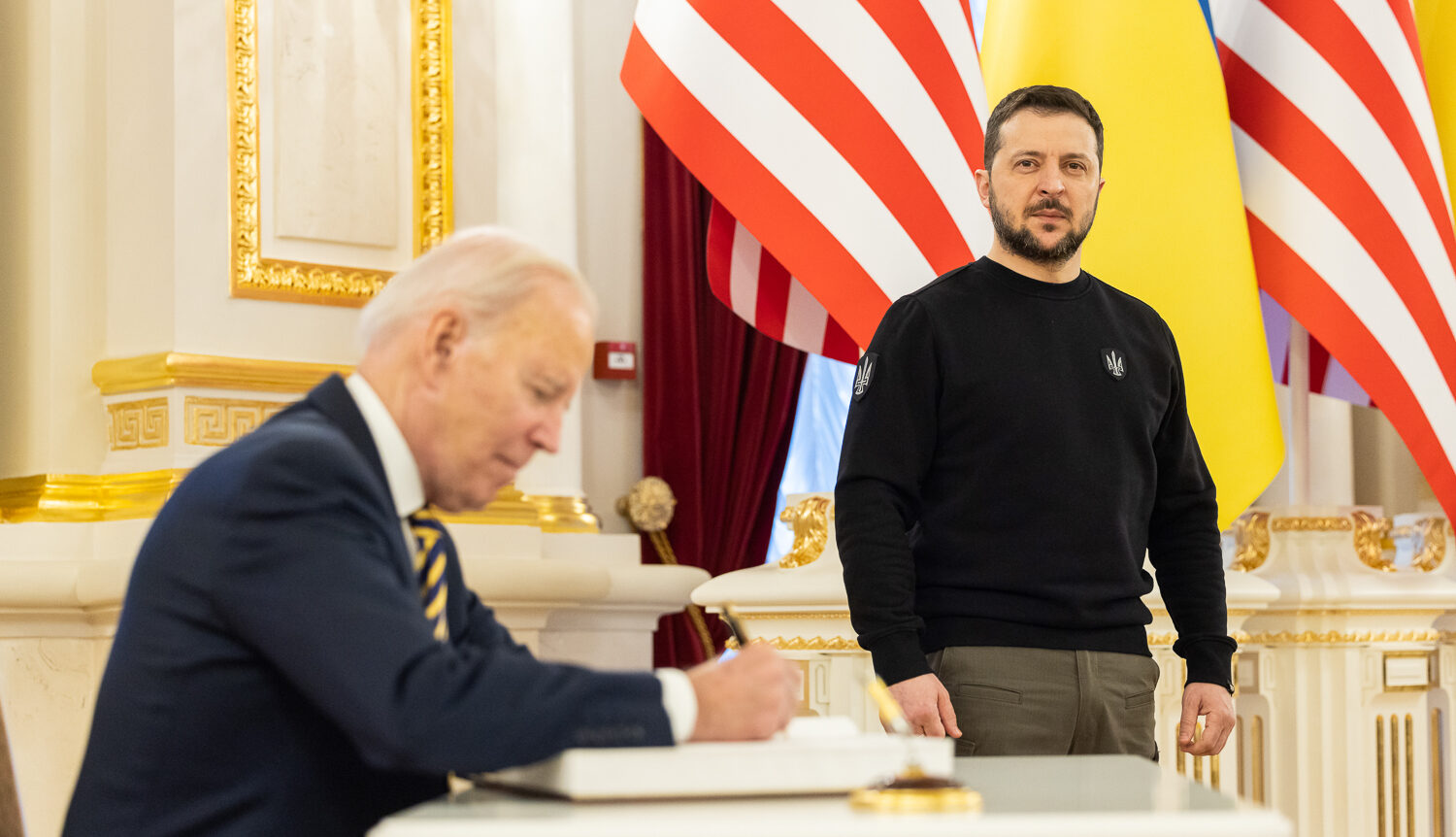The Biden Admin Is Trying to Guarantee a Forever War in Ukraine
Washington and Kiev are negotiating a bilateral security agreement that mirrors the 10-year commitments Ukraine has entered into with several European powers.

As of two weeks ago, $61 billion would supposedly make the difference in the defense of Ukrainian sovereignty.
“This support will really strengthen the armed forces of Ukraine, and we will have a chance for victory,” President Volodymyr Zelensky told NBC’s “Meet the Press” about the $61 billion in new Ukraine aid, which made up the bulk of a supplemental spending package doling out $95 billion in foreign aid.
That narrative has died a swift and silent death. “Ukraine’s $61 bln lifeline is not enough,” one Reuters headline read. Another, from the Atlantic Council: “New US aid package is not enough to prevent Russian victory in Ukraine.”
The Congressional Budget Office estimates that, because of the aid package, defense outlays will remain higher than expected not only this year but until at least the end of the decade. That is evidently not enough of a long-term commitment. In a video address over the weekend, Zelensky dropped a massive bombshell: Kiev and Washington are working on a bilateral security agreement to keep America in the war for the long haul.
“Our teams, Ukraine and the United States, are currently working on a bilateral security agreement, and we are already working on a specific text,” the Ukrainian president claimed. “Our goal is to make this agreement the strongest of all. We are discussing the specific foundations of our security and cooperation. We are also working on fixing specific levels of support for this year and for the next ten years, including armed support, financial, political, and joint arms production.”
On Monday, Ukrainian and American officials held their third round of negotiations about this bilateral security agreement via teleconference. Head of the Presidential Office Andriy Yermak is running point for the Ukrainian negotiators. Yermak is confident of a deal in the near future—both sides are motivated by a certain worrying November election—and said the agreement would create “a solid foundation for long-term cooperation” to produce results that “directly contribute to the defeat of Russia.”
As America and central European powers started hinting a willingness to provide Ukraine more aid since late last year, Ukrainian diplomatic efforts have kicked into overdrive. In July of 2023, at both the NATO summit in Vilnius and the G7 meeting in Hiroshima, several nations agreed to consider bilateral security agreements with Ukraine.
The UK led the pack. During a January trip to Kiev, British Prime Minister Rishi Sunak announced the Brits were providing Ukraine with another $3.2 billion in aid and that London and Kiev had entered into a bilateral security agreement—the details of which mostly remain unknown—that would persist for 10 years or until Ukraine is granted NATO membership.
Germany and then France followed in February. Like the Brits, both unveiled new aid packages and signed bilateral security pacts. The German aid package amounted to $1.2 billion, and the French package matched the British at $3.2 billion. Latvia, Finland, Denmark, Canada, Italy, and the Netherlands all followed with their own bilateral security agreements with Zelensky’s government.
The big fish remains the United States. Europeans can sign bilateral security agreements, but the recent dollar values in Ukraine aid from Britain, Germany, and France suggest Europeans are still hesitant to put their money where their mouths are. On the other hand, Uncle Sam is still cutting the big checks.
Without preemptive measures, that may not last forever. Donald Trump and the GOP, for the moment, are in the electoral catbird seat. Sure, Trump has been amenable to some level of Ukraine aid, perhaps in the form of a loan, but his instinct remains to distance America from a land war in distant eastern Europe. While House Speaker Mike Johnson overrode his own conference in bringing Ukraine aid to the floor, doing so has essentially doomed his leadership—the only question remains whether the GOP makes a switch in January 2025 or before.
Subscribe Today
Get daily emails in your inbox
It is Trump’s possible return, more than anything else, that is driving the Ukrainians and their Western backup chorus to push bilateral agreements.
They are pursuing other means of “Trump-proofing weapons transfers to Ukraine” as well. “The U.S. and other Western countries are considering transferring to NATO a U.S.-led multinational group that coordinates the shipment of weapons to Ukraine, one of several new proposals that could help maintain the flow of arms to Kyiv under a second Donald Trump presidency,” POLITICO reported. In the pages of this magazine, Sen. J.D. Vance of Ohio laid out the argument that, by extending Ukraine aid beyond 2024, Ukraine hawks are trying to limit Trump’s diplomatic options were he to return to the White House and could potentially use a refusal to aid Ukraine as “a predicate to impeach him.”
The foreign policy blob has decided: at least 10 more years. Is it still too soon to call it a forever war?
Comments